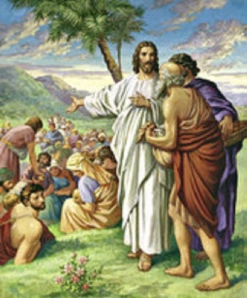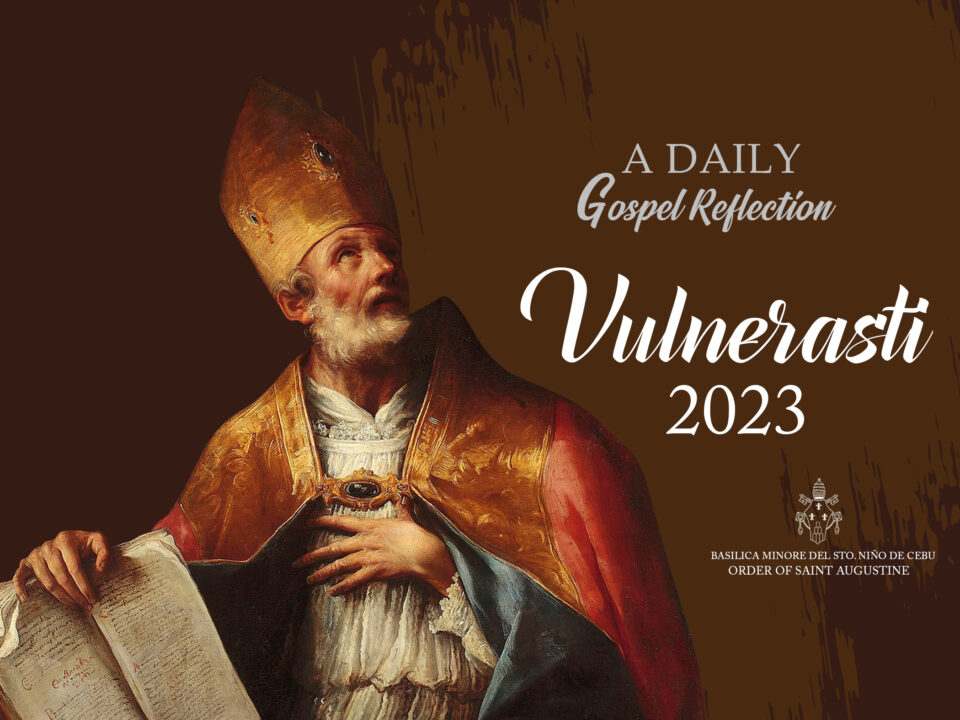The Solemnity of the Most Holy Body and Blood of Christ

https://francisxaviersamsen.wordpress.com/2013/05/15/thursday-may-30th-holy-gospel-of-jesus-christ-according-to-st-luke-911-17/
Today’s Reflection
Gospel: Mt 6:24-34
June 19, 2022 | Sunday
But the crowd heard of this and caught up with him. So he welcomed them, and began speaking about the kingdom of God, curing those who needed healing.
The day was drawing to a close, and the Twelve drew near to tell him, “Send the crowd away, and let them go into the villages and farms around, to find lodging and food, for we are here in a lonely place.” But Jesus replied, “You, yourselves, give them something to eat.” They answered, “We have only five loaves and twofi sh. Do you want us to go and buy food for all this crowd?” for there were about five thousand men. Then Jesus said to his disciples, “Make them sit down in groups of fifty.”
So they made all of them sit down. Jesus then took the five loaves and two fish, and, raising his eyes to heaven, pronounced a blessing over them; he broke them, and gave them to the disciples to distribute to the crowd. They ate and everyone had enough; and when they gathered up what was left, twelve baskets were filled with
broken pieces.
Today’s Reflection:
The Gospel Reading speaks of the feeding of the multitude which is the only “miracle” of Jesus reported in the four canonical gospels (cf. Mt 14:13-21; Mk 6:32-44; Jn 6:1-15). Did Jesus literally multiply the loaves and fish and at once feed more than 5000 people?
The four evangelists situate the feeding of the multitude in a deserted place where Jesus and his disciples are in a dilemma whether to send the hungry crowd away or to feed them. The suggestion of the disciples is to send the crowd away to secure food for themselves (e.g. Lk 9:12). This is a rather sensible suggestion since Jesus and his disciples are exhausted after a daylong apostolate of preaching and healing. Besides, in no way can they afford to feed the people because they themselves are dependent on the hospitality of the people for food and other needs (Lk 9:3).
Going against his disciples’ position, Jesus proposes that they themselves give food to the people. His counterproposal appears to be too good to be true. The foods at their immediate disposal amount only to five loaves and two fish. But Jesus is dead serious in his suggestion as intimated in the way he addresses the disciples: “You give them something to eat” (Lk 9:13). The vocative pronoun “you” (ὑμεῖς) here is empathic in the original Greek. This means that Jesus puts extra emphasis on the role of the disciples in feeding the people. And the disciples heed the Lord’s exhortation. They collaborate actively with him in doing the seemingly impossible task. How? Mark tells us that they do scout for food among the people in response to Jesus’ command to “go and see” what food they have at the moment (cf. 6:38). John specifies that the loaves and fish come from a little boy (cf. 6:9).
Which sheds some light to our question: In no way did Jesus defy the laws of nature in feeding the crowd. He neither brought down bread from heaven nor did he turn stones into bread. What he and the disciple did was to gather the foods from the people themselves and equitably redistributed these back to them. They organized a sort of a potluck meal. In other words, what actually happened was not a literal multiplication of loaves and fishes but a redistribution of foods. This is suggested in the narratives of the four evangelists in which they recount how Jesus took the loaves and fish, blessed and broke them and then gave them to the disciples for redistribution to the people (cf. Mt 14:19; Mk 6:41; Lk 9:16; Jn 6:11).
In what sense is this event miraculous? The synoptics call this astounding event “dunamis” (δύναμις) which is often translated not as a miracle but as a “powerful deed” (e.g. Lk 10:13). As an aside, it is from this Greek word where the word “dynamite” is derived. The evangelist John, moreover, calls this event “semeion” (σημεῖον). This word means “sign” which points to the divinity of Jesus (e.g. Jn 6:14).
Neither a powerful deed nor a sign necessarily breaks the laws of nature. The multiplication of the loaves is a “powerful deed” in the sense that the Lord enables the disciples as well as the crowd to transcend their human desire for self-preservation. The Lord enables the tired disciples to transcend their need for rest and attend to the hungry crowd. Likewise, he turns the rather selfish crowd into generous individuals. A profound sharing of goods takes place. Everybody gets satiated. It turns out that what they have in that evening in a deserted place is more than they can consume. Indeed, an awe-inspiring thing happens if the Lord gathers and blesses what we have.
Our world today is no different from the world as described by an eight-century Chinese poet named Tu Fu: “Behind the red-lacquered gates, wine is left to sour meat to rot. Outside these gates lie the bones of the frozen and the starved. The flourishing and the withered are just a foot a part. It rends my heart to ponder on it.” More than pondering on the massive inequalities in our world today, may we respond favorably to the exhortation of the Lord in the Gospel. May we respond as the disciples did. May we become the Lord’s active partners in the promotion of a more just and equitable world. (by Fr. Lazaro N. Ervite, OSA)/Vulnerasti, 2022



